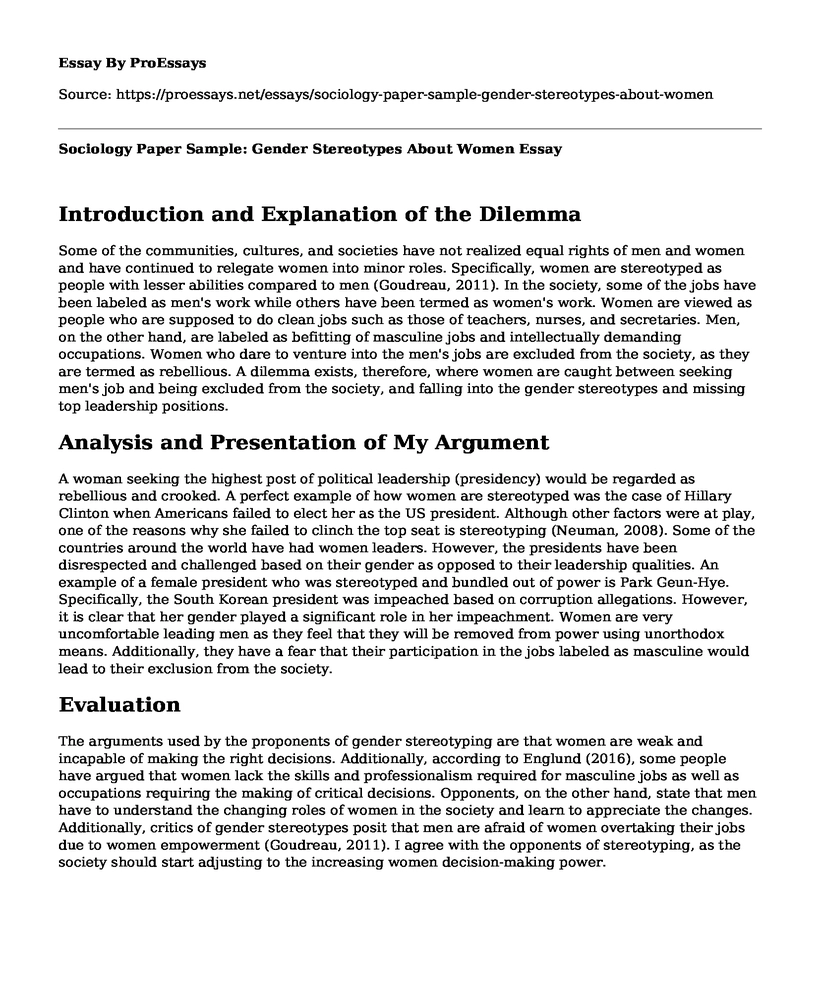Introduction and Explanation of the Dilemma
Some of the communities, cultures, and societies have not realized equal rights of men and women and have continued to relegate women into minor roles. Specifically, women are stereotyped as people with lesser abilities compared to men (Goudreau, 2011). In the society, some of the jobs have been labeled as men's work while others have been termed as women's work. Women are viewed as people who are supposed to do clean jobs such as those of teachers, nurses, and secretaries. Men, on the other hand, are labeled as befitting of masculine jobs and intellectually demanding occupations. Women who dare to venture into the men's jobs are excluded from the society, as they are termed as rebellious. A dilemma exists, therefore, where women are caught between seeking men's job and being excluded from the society, and falling into the gender stereotypes and missing top leadership positions.
Analysis and Presentation of My Argument
A woman seeking the highest post of political leadership (presidency) would be regarded as rebellious and crooked. A perfect example of how women are stereotyped was the case of Hillary Clinton when Americans failed to elect her as the US president. Although other factors were at play, one of the reasons why she failed to clinch the top seat is stereotyping (Neuman, 2008). Some of the countries around the world have had women leaders. However, the presidents have been disrespected and challenged based on their gender as opposed to their leadership qualities. An example of a female president who was stereotyped and bundled out of power is Park Geun-Hye. Specifically, the South Korean president was impeached based on corruption allegations. However, it is clear that her gender played a significant role in her impeachment. Women are very uncomfortable leading men as they feel that they will be removed from power using unorthodox means. Additionally, they have a fear that their participation in the jobs labeled as masculine would lead to their exclusion from the society.
Evaluation
The arguments used by the proponents of gender stereotyping are that women are weak and incapable of making the right decisions. Additionally, according to Englund (2016), some people have argued that women lack the skills and professionalism required for masculine jobs as well as occupations requiring the making of critical decisions. Opponents, on the other hand, state that men have to understand the changing roles of women in the society and learn to appreciate the changes. Additionally, critics of gender stereotypes posit that men are afraid of women overtaking their jobs due to women empowerment (Goudreau, 2011). I agree with the opponents of stereotyping, as the society should start adjusting to the increasing women decision-making power.
Summary
In most of the societies and cultures, women face the dilemma of avoiding masculine jobs and leadership positions and remaining within their stereotypes, and challenging men in leadership positions and being excluded from the society. Although a variety of women presidents exist, they have faced a lot of unjustified criticism in the quest to get them out of power. Although proponents of gender stereotyping argue that women are weak, I agree with the opponents that the society should adjust to the changing power of women in the areas of leadership and decision-making.
References
Englund, W. (2016). How stereotypes of women as weak push female politicians to be hawkish. Washington Post. Retrieved 28 January 2017, from https://www.washingtonpost.com/opinions/how-stereotypes-of-women-as-weak-push-female-politicians-to-be-hawkish/2016/10/27/036b233a-8977-11e6-875e-2c1bfe943b66_story.html?utm_term=.08011c57132bGoudreau, J. (2011).
The 10 Worst Stereotypes About Powerful Women. Forbes.com. Retrieved 28 January 2017, from http://www.forbes.com/sites/jennagoudreau/2011/10/24/worst-stereotypes-powerful-women-christine-lagarde-hillary-clinton/#2b600fba1becNeuman, S. (2008).
Gender stereotypes pose challenges for Hillary Clinton's bid for the presidency: To be not to be a Lady. The Source. Retrieved 28 January 2017, from https://source.wustl.edu/2008/03/gender-stereotypes-pose-challenges-for-hillary-clinton-bid-for-the-presidency/
Cite this page
Sociology Paper Sample: Gender Stereotypes About Women. (2021, Apr 01). Retrieved from https://proessays.net/essays/sociology-paper-sample-gender-stereotypes-about-women
If you are the original author of this essay and no longer wish to have it published on the ProEssays website, please click below to request its removal:
- Psychology Paper Sample: How Parental Verbal Abuse Affects Child Personality and Social Behavior
- Critical Thinking on the Sex Tourism Problem
- A Girl Who Changed Into a Boy - Paper Example
- The Refugees and Asylum Seekers: Essay Sample
- Essay Example on Carlos the Jackal: Notorious Terrorist and Revolutionary
- Essay Sample on Community Life: Sharing Resources & Promoting Co-Existence
- Essay Example on Poverty: Collective Experience for Families & Children, Evidence-Based App







